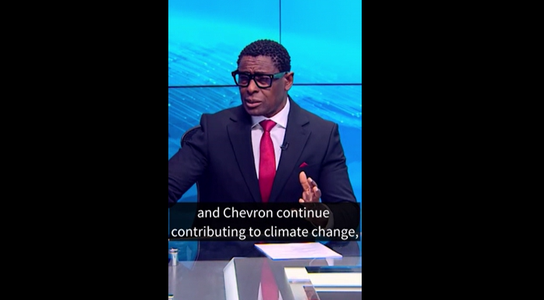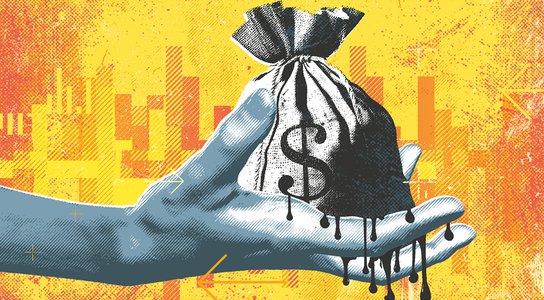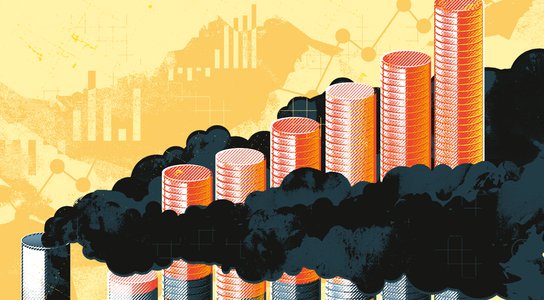Fresh allegations against Eni related to corrupt oil deal
15th March 2021, London - Italian energy giant Eni has been granted privileged access to push fossil gas at the highest echelons of the EU, whilst being on trial for a vast alleged bribery scheme involving hundreds of millions of dollars funnelled to politicians, according to a new report from Global Witness that also reveals alleged attempts to obstruct justice by Eni executives.
“Polluting the Process” finds Eni’s CEO Claudio Descalzi - who is also individually on trial in the same Italian case - met with the EU’s Energy Commissioner as recently as last June. Despite facing a possible eight year prison term, Descalzi was granted a meeting with one of the EU’s most senior officials to discuss the role of fossil gas in the future of the EU, amongst other topics. It follows a meeting with the Commissioner for Internal Markets in September 2018 - the very same month public hearings in the corruption trial began.
Eni’s in-house lobbyists hold more passes for the European Parliament than any other oil and gas firm, and their 49 meetings with senior EU officials since 2014 is the second most of all Italian companies. In that time Eni, and the pro-fossil gas industry groups it is a member of, have spent upwards of 100 million Euros lobbying in Europe.
With coal and oil out of vogue in the EU, fossil gas has become a key last stand for fossil fuel companies, with Eni central to the industry’s push. A presentation, sourced by Global Witness from public records freedom of information requests, delivered by Eni to EU climate officials argued for gas as a “clean and safe partner” for renewables and called for support for the “coal-to-gas switch”.
Barnaby Pace, Gas Campaigner at Global Witness, said:
“The European Commission has waxed lyrical over its ambitions to fight climate change yet grants unrivalled access to some of the world's biggest polluters. Serious action on the climate will not come about by giving fossil fuel companies access to policy making, particularly those who seem ever willing to ride roughshod over the rules.”
“Fossil fuel companies must be prevented from polluting the political process. We don’t ask tobacco companies for advice on quitting smoking, so we shouldn’t be asking those who got rich from oil and gas for climate advice.”
Later this month a verdict is expected in the Italian trial where Eni, Shell and senior executives including Descalzi are accused of knowing the $1.1bn they paid in 2011 for a Nigerian offshore oil field (OPL 245), would be used to pay bribes to Nigerian public officials.
Italian prosecutors also allege that Eni executives arranged kickbacks for themselves as part of the deal. In a separate, fast-tracked Italian trial, two middlemen involved in the deal have already been sentenced to jail terms with the judge in that case ruling that the management of Shell and Eni were “fully aware” that part of their $1.1bn payment for the block “would be used to remunerate Nigerian public officials''. She further ruled that it was proven that Eni managers planned and possibly received kickbacks from the deal. The conviction has been appealed.
The ruling in the fact-tracked trial does not in any way determine the guilt of defendants in the ongoing trial, though it shows that the allegations against Eni, Shell, Descalzi and others are credible and must be taken seriously. The defendants in the case have all pleaded not guilty and denied wrongdoing.
Allegations of misconduct against Eni do not stop there. Italian prosecutors have alleged that Eni managers ordered surveillance against journalists, prosecutors and possibly even judges. Descalzi and several other Eni managers are suspects in a related criminal investigation into attempts to interfere in the investigation into the OPL 245 case.
Eni told Global Witness that all the charges and allegations regarding OPL 245 and the alleged conspiracy are unsubstantiated and they have provided all the evidence to the Milan court and judicial authorities to support their case. Eni also stated that its transition plan “is ambitious, detailed, and wider in scope commitments than our peers and has been welcomed by a number of external experts and commentators” and that it rejects “the allegations and ìnsinuations” regarding the company’s “commitment to the energy transition.”
The European Commission told Global Witness that “As regards meetings, it is largely at the discretion of the Members of the Commission whether they meet someone or not.” though they also said that “companies and associations which are active in the fossil fuel sector are affected by the EU policies on the European Green Deal and have a right to make their views heard.” They added “many companies in the energy sector have diverse interests and have diversified their energy production, which often includes renewable energy sources. It would therefore be a simplification to reduce their role to one single aspect of their activities and interests. Readiness to read or listen to others’ views does not necessarily mean political agreement, but is an essential part of democracy in the Commission’s view“.
Barnaby Pace, said:
“From the criminal investigations into Descalzi and Eni you’d be forgiven for thinking this is an organised crime group on trial rather than a global oil and gas firm. Eni managers are accused of interfering in investigations, attempting to bribe a witness, and spying on law enforcement and journalists on top of paying hundreds of millions of dollars in bribes, all to secure oil and gas that cannot be burned if we are to avoid the worst impacts of climate change.
Key Recommendations:
European officials should institute a firewall to end the fossil fuel industry’s access to decision-making.
Interactions with the fossil fuel industry should only occur where strictly necessary to enable lawmakers, regulatory bodies, and public authorities to effectively regulate the industry and accelerate the transition to a fossil free Europe.
Where interactions do occur, they must be requested by public officials or lawmakers and be conducted transparently, for example through public hearings, public notice of interactions and minutes of meetings. The names of executives who lobby public officials should not be secret.
European Commissioners and other public officials should decline any further lobbying meetings with Eni and its senior executives given the credible allegations of serious criminality against them.
Key findings:
The Italian criminal trial against Claudio Descalzi, Eni, Shell, and other defendants began public hearings in September 2018, with prosecutors alleging bribery and kickbacks in Eni and Shell’s 2011 deal for the OPL 245 license.
In November 2020, Descalzi and other Eni managers were also named as suspects in a separate Italian investigation into alleged attempts to interfere with the OPL 245 criminal investigation.
Claudio Descalzi met the European Commissioner for Internal Market in September 2018.
Claudio Descalzi met the EU Energy Commissioner in June 2020 to discuss Eni’s strategy, decarbonisation of gas and clean energy investments.
Eni’s in-house lobbyists hold 6 European Parliament passes – more than any other oil and gas company lobbying in Brussels.
Since 2014 EU Commissioners/ their cabinet members/ director generals have reported 49 meetings with Eni lobbyists – second most of any Italian company.
Eni and the pro-gas industry groups it declares membership have collectively declared spending 100 million euros lobbying in Europe since 2014.
Eni has held prominent positions in all major pro-gas lobbies in the EU that have held 129 meetings with senior European Commission officials since 2018 (nearly 1 meeting per week).
Rystad predicts Eni will be one of the biggest investors in fossil gas, projecting $36 billion in gas investments over next 10 years.
In addition to Eni, Global Witness contacted featured companies and key individuals – see report for further details.


